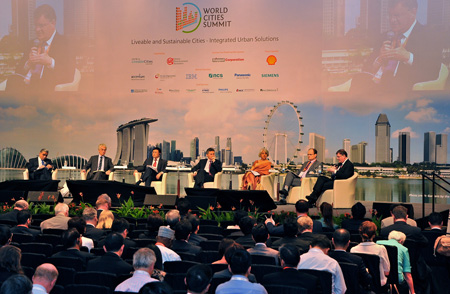
(Photo credit: World Cities Summit)
By 2030, the United Nations forecasts that more than half of the world's population will live in cities. There will be at least 37 megacities metropolitan areas with more than 10 million people straining existing infrastructure and putting pressure on the environment. Already, many cities around the world grapple with the continued inflow of migrants mostly from rural areas who require access to clean water and a stable power supply, transport, sewage and housing.
These concerns were topmost on the minds of city leaders and urban planning experts who attended the biennial World Cities Summit (WCS) held in Singapore last week. More than 100 mayors from ASEAN countries, Africa, South America, India and Russia along with development experts gathered to discuss how to provide city-dwellers with a decent standard of living, and to ensure that their cities had a low carbon and sustainable future. In the plenary and breakout sessions, they listened to best practice solutions and exchanged ideas on technological innovations. The Summit also saw a number of new business partnerships being forged.
WCS Chairperson Lee Yi Shyan, Singapore's Minister of State for National Development and Trade, acknowledged the differences across cities of the world, but urged city leaders to make bold policy decisions in consultation with members of the public. He added: ""I am quite certain that our collective experiences would still offer unique and new insights into better approaches and solutions as we build our future cities and cities' future.
The Summit also saw city leaders take the opportunity to share the challenges their cities faced and solutions that they had embarked on.
Singapore Prime Minister Lee Hsien Loong noted that Singapore, with its limited natural resources, prices energy and water at full cost without subsidies to encourage its 5.2 million population to conserve both resources. Low-income families are given rebates to cope with utilities prices, while technological innovation has resulted in NEWater--high-grade reclaimed water that can be created from water of any quality.
India's Urban Development Minister Kamal Nath described urbanisation as India's biggest challenge. "As India grows, growth has preceded infrastructure. We've a huge infrastructure deficit," he said. India is preparing a US$14 billion federal funding initiative to help states improve their urban services. However, good governance is sometimes hindered by bureaucracy and election cycles, he noted.
About S$13.6 billion worth of projects, tenders, investments and research and development MOUs were awarded and announced at SIWW, which was attended by over 18,000 participants from government, R&D organisations and industry. Among the joint collaborations in R&D were national water agency PUB's MOU with MEIDEN Singapore for the first Ceramic Membrane Bioreactor (MBR) Demonstration Plant to recycle industrial used water. Separately, governments and businesses also announced their latest investments in the areas of industrial water solutions and showcased prototypes of some new, cutting-edge local technologies to aid in sustainable water management.